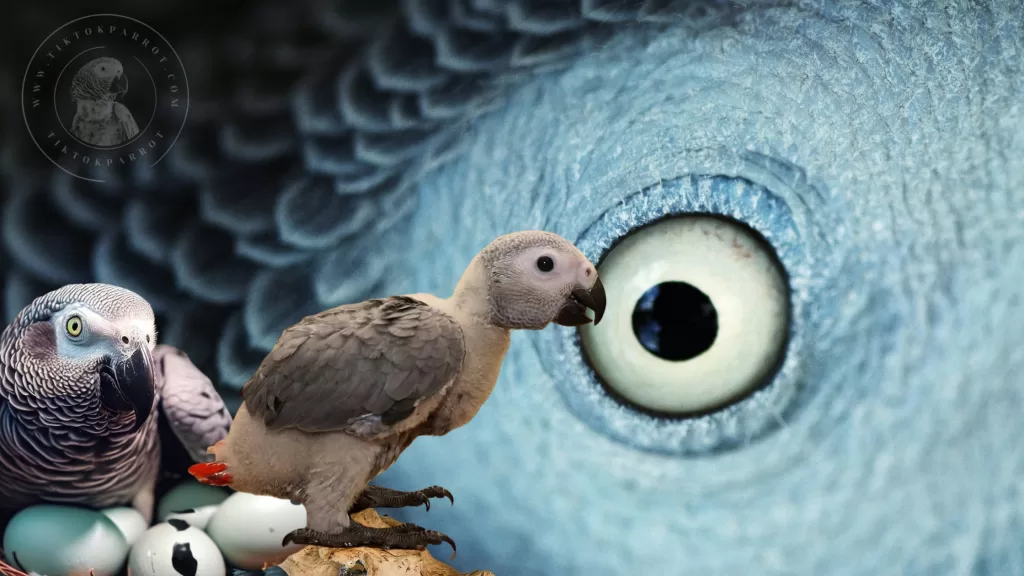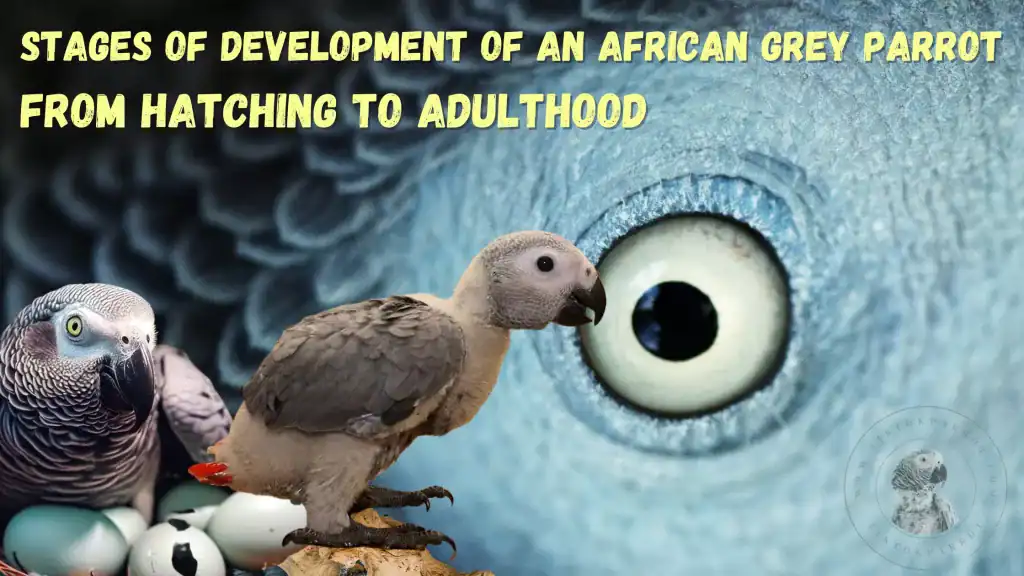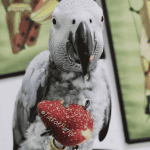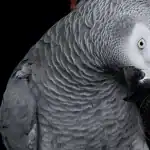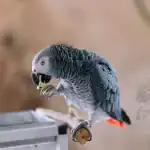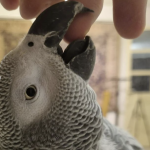Your African Grey parrot did not become a mature and well-adjusted pet overnight. Your pet had to go through several stages to get to where he is now. As such, your beautiful intelligent bird had to undergo different stages of development that had distinct characteristics. The different stages come with physical changes as well as emotional changes.
In short, an African Grey parrot goes through the following stages: baby stage, “rejection of maturity” stage, “behavioral maturity stage”, and adulthood. Each stage is greatly different from the rest, much like the stages of development of a human person.
Learn about the stages of development of an African Grey parrot from hatching to adulthood. Discover how to care for and train these intelligent and charismatic birds at each stage.
Let’s start with the first stage: the baby stage. The onset of the baby stage is prepared when the female African Grey parrot lays her eggs. Both parents, the mother, and the father care for the chicks when they hatch. Upon hatching, the baby African Grey parrots spend about two to three months with their parents.
During this period, the babies depend on their parents entirely for food and care. When the babies are about four months old, they can start out on their own but still need to depend on their parents for basic care. But during this time, the baby African Grey parrots can start to learn to feed themselves.
The next stage in an African Grey parrot’s development is referred to as the “rejection of maturity” stage. Even in the wild, young African Grey parrots still live with their parents for at most a year after hatching from the eggs.
The young parrots are just wired to stick close to their family unit. This is probably because a baby African Grey parrot needs that much time to mature and become an independent parrot. In captivity, even though some African Grey parrots are already a year old, they may still be considered babies as they are often difficult to wean and feed.
Other parrots seem to have the “Peter Pan Complex” of not wanting to grow up. Thus, they “reject maturity” by choosing to be hand-fed than eat on their own.
The third stage of development that an African Grey parrot undergoes is behavioral maturity. This stage has to do with the parrot’s ability to learn vocalizing at faster rates than other kinds of parrots and its ability to behave the way parrots are expected. Because of their superior intelligence, African Grey parrots begin vocalizing and start learning how to mimic sounds while there are still growing feathers.
The last stage in the development of an African Grey parrot is adulthood. Compared with other species in the parrot family, African Grey parrots take longer to mature. Whereas a parrot from the Amazon is considered mature at six months old, an African Grey parrot is not yet independent at that age.
The African Grey can take about a year longer than its Amazon cousins to be fully independent of its parents. This can be seen in African Grey parrots that are kept as pets. These parrots choose to be hand-fed rather than feed themselves at one year old.
If you’re a new pet owner, I will categorize and explain the topic in detail to help you better understand the stages of development of an African Grey parrot.
From Hatching to Adulthood
Have you ever wondered how an African Grey parrot grows from a hatchling to an adult bird? The stages of development of an African Grey parrot are fascinating and crucial to understand for those who want to care for and train these intelligent and charismatic birds.
In this section, we will take a closer look at the stages of development of an African Grey parrot and provide insights into how to care for them at each stage.
Introduction
African Grey parrots are one of the most popular bird species in the world. They are known for their exceptional intelligence, problem-solving abilities, and their incredible mimicry of human speech. However, caring for an African Grey Parrot requires an understanding of their developmental stages. In this article, we will explore the five stages of development of an African Grey parrot and provide tips on how to care for them at each stage.
Stages of Development of an African Grey Parrot
The developmental stages of an African Grey parrot can be divided into five distinct stages: the hatching stage, the nestling stage, the fledgling stage, the juvenile stage, and the adult stage.
The Hatching Stage
The hatching stage marks the beginning of the African Grey parrot’s life. It begins when the egg is laid and lasts until the chick hatches from the egg. During this stage, the chick is entirely dependent on the mother for food and warmth. The chick will remain in the egg for around 28 days, during which the embryo develops and grows.
The Nestling Stage
The nestling stage begins once the chick has hatched from the egg. At this stage, the chick is still entirely dependent on the mother for food and care. The mother will regurgitate food for the chick, and the chick will grow rapidly during this time. At around three weeks old, the chick will start to develop feathers, and by the fourth week, it will have a full set of feathers.
The Fledgling Stage
The fledgling stage begins when the chick leaves the nest and learns to fly. This usually occurs around 12 weeks old. During this stage, the chick will learn to explore its surroundings and develop its coordination and balance. The bird will also learn to feed itself and will start to eat solid food. It’s essential to ensure that the bird’s environment is safe and secure during this stage, as the bird is still developing its motor skills.
The Juvenile Stage
The juvenile stage begins when the bird reaches sexual maturity. At this stage, the bird will start to develop its unique personality and begin to show signs of independence. The bird will also start to molt its feathers, and its colors will begin to change. This stage lasts from one to three years, and it’s essential to continue providing a healthy diet and environment to support the bird’s growth and development.
The Adult Stage
The adult stage begins when the bird reaches full maturity. This stage can last up to 50 years or longer, and it’s essential to continue providing proper nutrition, care, and enrichment throughout the bird’s life. African Grey parrots are intelligent birds that require mental stimulation to remain healthy and happy.
FAQ (frequently asked questions)
When do African Grey Parrots start talking?
African Grey parrots can start to mimic sounds at around six months old, but they may not start talking until they are around one year old.
How often should I feed my African Grey Parrot?
African Grey parrots require a balanced diet consisting of pellets, fruits, vegetables, and occasional treats. It’s best to feed your bird twice a day, in the morning and evening, and provide fresh water at all times. It’s important to monitor your bird’s weight and adjust its diet accordingly.
How can I train my African Grey Parrot?
African Grey parrots are highly intelligent and can be trained to do a variety of tricks and behaviors. Positive reinforcement is the best way to train these birds, and it’s important to be patient and consistent. Clicker training and target training are effective methods for training African Grey parrots.
How can I tell if my African Grey Parrot is sick?
African Grey parrots are prone to certain health issues, such as respiratory infections, feather picking, and nutritional deficiencies. Signs of illness include lethargy, loss of appetite, difficulty breathing, and changes in behavior. It’s essential to take your bird to a veterinarian specializing in avian care if you notice any of these signs.
How can I provide enrichment for my African Grey Parrot?
Enrichment is crucial for the mental and physical well-being of African Grey parrots. Providing toys, perches, and puzzles can keep your bird entertained and engaged. It’s important to rotate toys and provide a variety of stimuli to prevent boredom.
Can African Grey Parrots bond with their owners?
Yes, African Grey parrots are known for their ability to bond with their owners. These birds have excellent memories and can recognize individuals and remember past interactions. Bonding with your African Grey Parrot can strengthen your relationship and improve its quality of life.
How much sleep does an African Grey Parrot need?
African Grey parrots need around 10-12 hours of sleep per night to stay healthy and active during the day.
How often should I clean my African Grey Parrot’s cage?
It’s important to clean your African Grey parrot’s cage at least once a week, and more frequently if necessary. This includes changing the bedding, wiping down surfaces, and disinfecting the cage.
Can African Grey Parrots learn to talk in different languages?
Yes, African Grey parrots can learn to mimic sounds in different languages, accents, and dialects.
How can I prevent my African Grey Parrot from biting?
Biting is a common behavior in African Grey parrots, but it can be prevented through positive reinforcement training, socialization, and providing proper toys and enrichment.
How can I socialize my African Grey Parrot?
Socializing your African Grey parrot involves exposing it to different people, places, and experiences. This can include taking your bird for walks, introducing it to new toys, and spending time with it outside of its cage.
How can I introduce a new African Grey Parrot to my existing bird?
Introducing a new African Grey parrot to an existing bird requires careful planning and monitoring. It’s important to provide separate cages and gradually introduce the birds through supervised interactions.
How long can African Grey Parrots live?
African Grey parrots can live up to 50 years or longer with proper care and nutrition.
Can African Grey Parrots fly?
Yes, African Grey parrots are excellent fliers and can fly up to 20 miles per hour.
How often should I take my African Grey Parrot to the vet?
African Grey parrots should have annual check-ups with an avian veterinarian, and more frequent visits may be necessary if there are any health concerns.
Can African Grey Parrots get bored?
Yes, African Grey parrots can get bored without proper enrichment and mental stimulation. This can lead to negative behaviors such as feather picking and aggression.
How can I train my African Grey Parrot to do tricks?
Training your African Grey parrot to do tricks involves positive reinforcement, consistency, and patience. Start with simple tricks and gradually increase the difficulty level.
How much should I expect to pay for an African Grey Parrot?
The cost of an African Grey parrot can vary depending on the breeder, age, and location. On average, they can cost anywhere from $1,000 to $2,500.
Can African Grey Parrots be kept with other birds?
African Grey parrots can be kept with other birds, but it’s important to monitor their interactions and ensure that the other birds are not a threat to their health or safety.
How can I prevent my African Grey Parrot from screaming?
Screaming is a natural behavior in African Grey parrots, but it can be prevented through positive reinforcement training, providing proper toys and enrichment, and addressing any underlying health or behavioral issues.
Can African Grey Parrots be trained to use a litter box?
Yes, African Grey parrots can be trained to use a litter box, but it requires patience and consistency. Start by providing a small litter box and gradually encouraging your bird to use it.
How can I prevent my African Grey Parrot from plucking its feathers?
Feather plucking is a common problem in African Grey parrots, and it can be prevented through providing proper nutrition, addressing any underlying health issues, and providing plenty of mental and physical stimulation.
How often should I bathe my African Grey Parrot?
African Grey parrots should be given a bath or shower at least once a week to keep their feathers clean and healthy.
Can African Grey Parrots be trained to perform in shows or competitions?
Yes, African Grey parrots can be trained to perform in shows or competitions, but it requires extensive training and preparation.
How can I train my African Grey Parrot to fly to me on command?
Training your African Grey parrot to fly to you on command involves positive reinforcement training and gradually increasing the distance and difficulty level.
How can I tell if my African Grey Parrot is male or female?
It can be challenging to determine the sex of an African Grey parrot, but a DNA test or surgical sexing can provide accurate results.
Can African Grey Parrots be trained to use a harness for outdoor walks?
Yes, African Grey parrots can be trained to use a harness for outdoor walks, but it requires patience and consistency.
How can I provide mental stimulation for my African Grey Parrot?
Providing toys, puzzles, and socialization with other birds and humans can provide mental stimulation for African Grey parrots.
Can African Grey Parrots learn to play games?
Yes, African Grey parrots can learn to play games, such as fetch, hide-and-seek, and puzzle games.
Can African Grey Parrots develop separation anxiety?
Yes, African Grey parrots can develop separation anxiety if they become too dependent on their owners. Gradual desensitization and providing plenty of mental stimulation can help prevent separation anxiety.
How can I prevent my African Grey Parrot from developing obesity?
Obesity can be prevented in African Grey parrots through providing a balanced diet, limiting treats, and providing plenty of opportunities for exercise.
How can I provide proper perching for my African Grey Parrot?
Providing perches of different sizes and materials can help prevent foot and leg problems in African Grey parrots.
How can I tell if my African Grey Parrot is stressed?
Signs of stress in African Grey parrots include aggression, feather plucking, loss of appetite, and changes in behavior. Addressing the underlying cause of stress and providing plenty of mental and physical stimulation can help alleviate stress.
How can I provide proper lighting for my African Grey Parrot?
Providing natural sunlight or full-spectrum lighting can help prevent health problems in African Grey parrots.
Can African Grey Parrots be trained to talk on cue?
Yes, African Grey parrots can be trained to talk on cue through positive reinforcement training and repetition.
My Final Thoughts
Understanding the stages of development of an African Grey parrot is essential for proper care and training. From the hatching stage to the adult stage, these birds undergo significant changes and require proper nutrition, care, and enrichment to thrive. By providing a safe and stimulating environment, you can ensure that your African Grey parrot lives a happy and healthy life.
So, if you’re considering adopting an African Grey parrot or already have one, remember to keep in mind their developmental stages and provide the best possible care for them.
If you found this blog helpful, It would be great if you could share it with your family and friends who might find it useful as well.
You might like to read these as well.
Breaking the Myths: The Truth About African Grey Parrot Eggs
Raising African Grey Chicks: Tips for First-Time Owners
How to Rear a Young African Grey Parrot
How to Breed African Grey Parrots
Types of African Grey Parrots
Tips for Buying an African Grey Parrot
Signs that an African Grey is unhappy with you
Why African Grey Parrots Pluck Feathers
Mental Illnesses in African Greys and How to Spot Them
Why an African Grey Parrot Bites and What to do
What diseases can African Grey parrots get?
What Do You Do If A Parrot’s Beak Breaks?
The Hidden Dangers of a Poor Diet for African Grey Parrots
How to Gain the Love of an African Grey Parrot
The social behavior of African grey parrots in the wild and in captivity
For more useful content about African grey parrots, you can subscribe my site with your email to get notification upon publishing a new blog, the subscribe box you can see on the right side of this page. Also if you get an alert on your web browser while browsing my site, allow it and that will also give you an alert whenever I publish a new blog. 🙂
Stay safe and much love !


If you are interested in supporting me, kindly consider utilizing my affiliate link for your Amazon purchases. Your support would be greatly appreciate.

